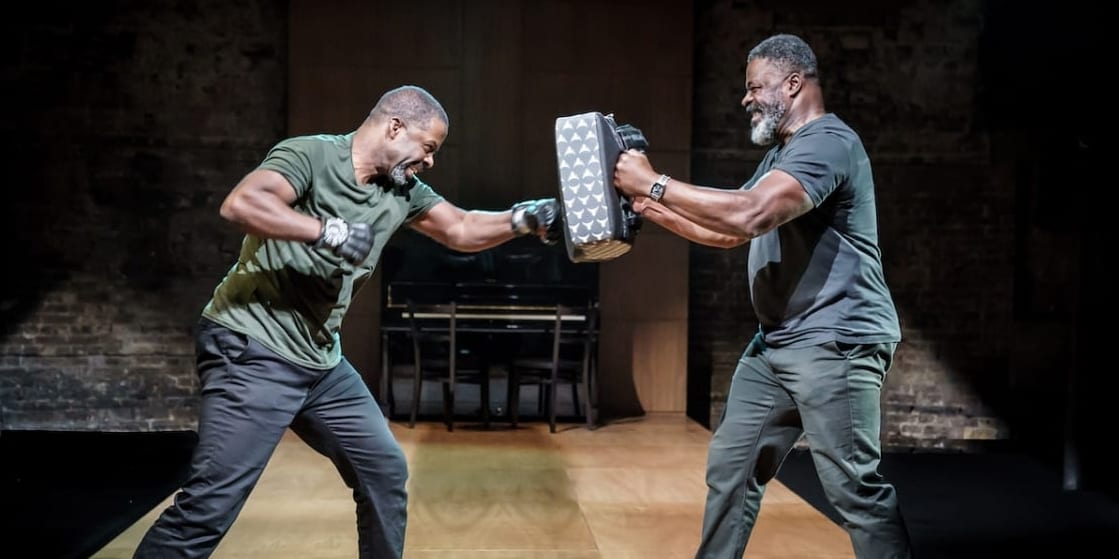‘Hymn’ is book-ended by two funeral orations but is much more of a hymn to love than anything churchy. In this case, the love is fraternal, neither physical nor romantic, and sustained over 90 minutes with remarkable power, variety of mood and delicacy of feeling by Adrian Lester (Gil) and Danny Sapani (Benny).
Gil’s father has just died, and Benny meets him after the funeral with a series of revelations that their father is in fact the same man. One has grown up in prosperity and the other alongside a struggling and unstable single mum. It’s a slow burn to start with as these two middle-aged men edgily circle one another unwilling to lower their guard. You get the impression that this is going to be a drama of resentment, rejection, and grievance. But writer Lolita Chakrabarti has some surprises in store, reminding you that she is the author of the excellent ‘Red Velvet’, notable for its beautifully judged twists and turns of plot and tone.
After ten minutes the play suddenly moves off into a new and unexpected gear of joyful acceptance and brotherly embrace. Benny is welcomed by Gil and his extended family and each enlarges the life of the other. Benny gets a great party for his 50th birthday and the prospect of a new job in a fashionable retail opportunity alongside his brother; and Gil escapes the shadow of his father’s disappointment with him in a newly bonded male friendship. But gradually the balloon of expectations empties, and the polarities of the relationship are startlingly reversed. The mood darkens and dwindles into a final, sharp and sobering poignancy.
The play was written with these actors in mind, and the well-matched chemistry is evident. Lester is all swaggering, cocky self-confidence to start with as the indulged heir to prosperity; and Sapani signs his self-doubt and insecurity with a combination of delicate restraint and anguished outbursts of powerful frustration. Both characters are studies in exposed vulnerabilities and how men can both reach out to each other and miss at the same time. As Benny says, ‘the pieces of your life you think are missing are not the right ones.’ We feel we get to know these characters across the full spectrum of their faults and talents. There is great interplay built over long sequences of dialogue and individual monologues giving each performance space to breathe and embellish.
In these times production values are at a premium, and the creative team deserve great credit for their ingenuity in bringing this production to life so well. In some ways, the very creative limitations are a stimulus to more intense results and effects. The actors cannot touch and in a play that is about coming together but missing key points that seems apt, achieving a final powerful communion of connection and separation. Director Blanche McIntyre achieves an admirable fluidity too on the traverse stage, ensuring that there is plenty of action to watch especially in two bravura episodes of music and dance where the actors really let rip with great technical skill.
It is a testament to how far we have come with streamed theatre in under a year that the camera angles have naturalism and variety that really make you forget the medium at times. Only on a few occasions was the camera a little too busy, breaking up the line and flow of the dialogue. Mostly this was an ideal match between the intimacy of dialogue and subtle close-up, switching from face to face just as you would yourself if you were lucky enough to be sitting in the front row of the theatre.
The actors manage their own costumes and props, with just a few fades and musical coverings to cover the transitions. Even this is technically demanding as the actors cannot touch the same objects. Sound and lighting schemes are discreet but meaningful. The various creative decisions show excellent judgement.
This is a memorable evening on screen making full virtues out of the obvious necessities. It promises to be even more affecting and impactful in person, as and when circumstances permit. The play certainly deserves a sustained run as it covers important themes with an affecting naturalism and strong narrative energy.

